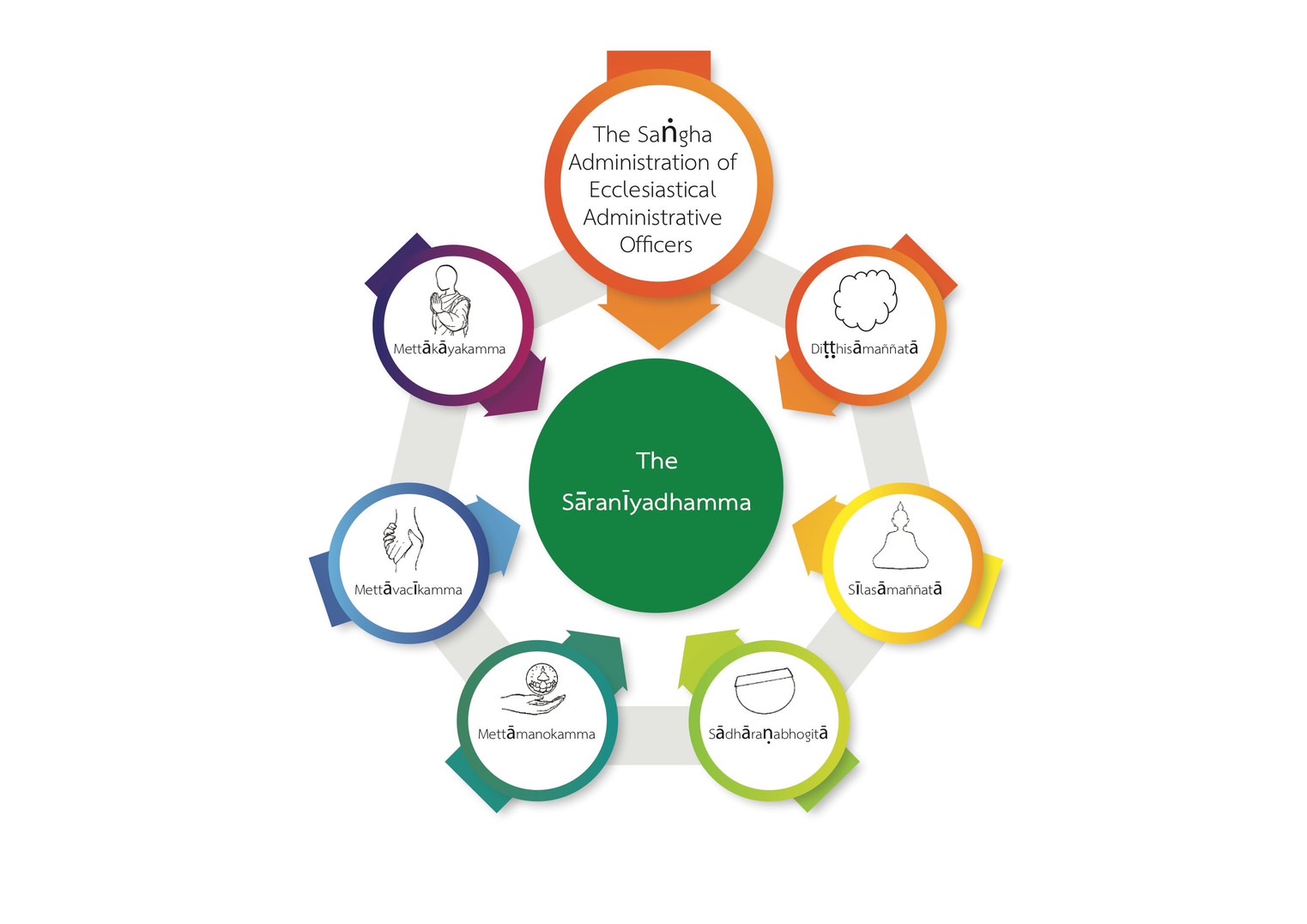THE EFFICIENCY OF THE SAṄGHA ADMINISTRATION BY ECCLESIASTICAL ADMINISTRATIVE OFFICERS IN SAṄGHA ADMINISTRATIVE REGIONS 17-18 (THE DHAMMAYUTIKA SECT)
Keywords:
Efficiency, Saṅgha Administration, Ecclesiastical Administrative OfficersAbstract
Background and Objective: In Thailand, Buddhism is an integral part of the society's structure. It has been preserved and practiced alongside other societal norms and values for a long time. The Saṅgha order takes itself as the order of representatives or followers of the Fully Enlightened One. The duties of the Saṅgha order comprise the mission of propagation, inheritance, and the transfer of Buddhadhamma and teachings. These duties are regarded as the important missions of the Saṅga order to act accordingly. Currently, the Saṅgha administration in Thailand depends on the Saṅgha Supreme Council of Thailand to administer regulations for commanding the subordinating Saṅgha order to be in proper domain with acceptable order. The Saṅgha Supreme Council of Thailand regulates the structure, hierarchy, and authority of ecclesiastical administrative officers in governing the Saṅgha order and temple management. This research aims to study the efficiency of the Saṅgha administration by ecclesiastical administrative officers in Saṅgha administrative regions 17-18 (The Dhammayutika Sect).
Methodology: In this quantitative research, the population consisted of 192 ecclesiastical administrative officers. The research tools included the questionnaires, which were used to collect data via an online channel with Google Forms. The statistics used for data analysis were descriptive statistics, which consisted of frequency and percentage for describing the sample demographics. The mean and Standard Deviation (S.D.) values were used in the efficiency analysis.
Main Results: The ecclesiastical administrative officers of the Dhammayutika Sect in Saṅgha administrative regions 17-18 were assigned duties that were divided according to the six aspects of Saṅgha administrative management consisting of the "Governance" aspect, the "Buddhist education" aspect, the "Buddhist propagation" aspect, the "Public education" aspect, the "Public assistance" aspect, and the "Public welfare" aspect. The results indicated a high level of the overall values. The analysis of each aspect demonstrated a moderate level of the "Governance" aspect; a high level of the "Buddhist education" aspect; a high level of the "Public education" aspect; a high level of the "Buddhist propagation" aspect; a high level of the "Public assistance" aspect; and a high level of the "Public welfare" aspect.
Involvement to Buddhadhamma: This study of applied Buddhism is to consider the efficiency that can be interpreted as the Buddhist principle and brought for combination in order to produce Buddhist innovations for the Saṅgha administration. This Buddhist principle is known as Sāraṇīyadhamma (Virtues for fraternal living), the teaching of the Buddha that refers to the guidelines of fraternal living. It is the principle for building conciliation within the Saṅgha order. The principle inspires the Saṅgha administration in Saṅgha administrative regions 17-18 (The Dhammayutika Sect) to achieve efficiency and effectiveness, as indicated in the result of the research.
Conclusions: The efficiency of Saṅgha administration in Saṅgha administrative regions 17-18
(The Dhammayutika Sect), which consisted of governance, Buddhist education, Buddhist propagation, public education, public assistance, and public welfare, was found to have a high level of overall values. Despite the results, such studies were required to find the problems and additional solutions. Its purpose was to develop the Saṅgha administration by ecclesiastical administrative officers in Saṅgha administrative regions 17-18 to achieve better efficiency and effectiveness under the Buddhist doctrine and the Buddhist monastic disciplinary rules for promoting Buddhism.
References
Bunthong, P. (2018). The Sanggha Administration of the Sanggha in Southern Thailand. Journal of MCU Nakhondhat, 5(1), 30-44.
Lumbensa, P. (2016). Finding the Quality of Measurement and Evaluation Tools for the Thasap Model Academic Service Project. Yala Rajabhat University.
Phra Methidhammapon (Prayun Dhammachitto). (1996). The Governance of the Thai Sangha. Sahadhammika.
Phra Narong Sangkhawichit. (2017). Present Thai Sangha Administration: Problems and Suggested Solutions. Journal of MCU Social Science Review, 6(1), 27-40.
Phrakru Wimon Suwanakorn, Thong-in, T. & Phra Raphin Phutthisaro. (2016). The Desirable Model of Sangha Administration of Administrative Monks at The Sangha Administration Region 1. Journal of MCU Social Science Review, 5(2), 15-26.
Phramaha Adisak Gavesako & Nuthongkaew, K. (2019). Effectiveness of Dhammayuttika Nikaya Sangkha's Affairs Adiministratoin in Nakhon Si Thammarat Province. Journal of mbu lnc, 26(2), 73-85.
Phramaha Jaran Bhurikovido. (2020). Guidelines for the Administration of Sangha Affairs based on the Buddhist Integration of Sangha Administrators in Nonthaburi Province. Journal of Graduate Studies Review, 16(1), 104-117.
Prasertsri, R. (2020). Management Administration for Changing in Globalization. Journal of MCU Social Science Review, 6(2), 545-552.
Sangha Act, 2505 B.E. (1962).
Sawetworrachot, T. (2019). Effectiveness of Dhammayuttika Nikaya Sangkha's Affairs Adiministratoin in Nakhon Si Thammarat Province. Journal of mbu lnc, 26(2), 73-85.
Sisabai, S. (2022). Sangha Law Division: Guidelines for The Establishment of The Sangha Aid Center on Law and Dispute for Strengthening Sangha Administration in Thai Society. Journal of MCU Social Science Review, 11(6), 301-314.
Watthanachaiwanich, R. (2021). Administration of Sangha Affairs of the Sangha Administrative Monks in the Three Southern Border Provinces. Mahachulagajasara Journal, 12(1), 44-58.

Downloads
Published
How to Cite
Issue
Section
License
Copyright (c) 2024 Journal of Buddhist Anthropology

This work is licensed under a Creative Commons Attribution-NonCommercial-NoDerivatives 4.0 International License.








